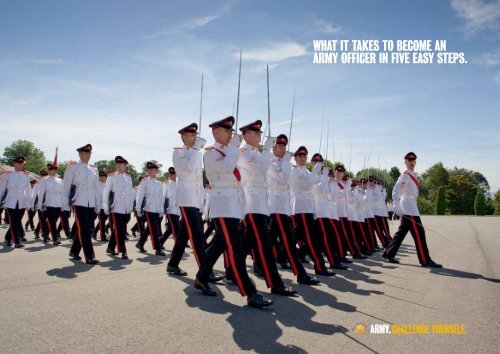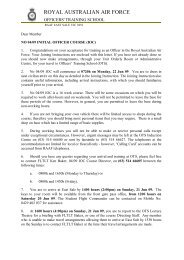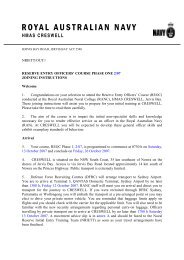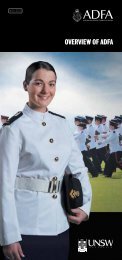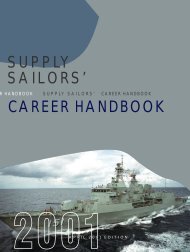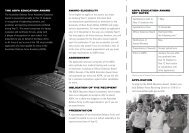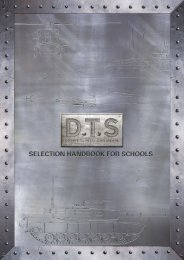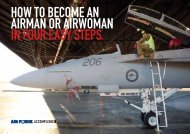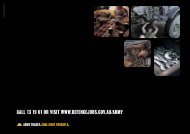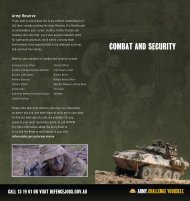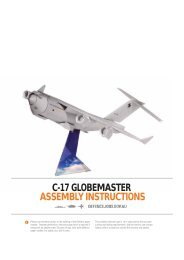Officer - Australian Defence Force Recruiting
Officer - Australian Defence Force Recruiting
Officer - Australian Defence Force Recruiting
- No tags were found...
Create successful ePaper yourself
Turn your PDF publications into a flip-book with our unique Google optimized e-Paper software.
WHAT IT TAKES TO BECOME ANARMY OFFICER IN FIVE EASY STEPS.1
LIFESTYLE.Having a job in the Army means that every day isdifferent. It’s an exciting career, filled with travel,adventure and once in a lifetime experiences.No career more challengingor rewardingToday’s Army operates in a far more complexstrategic environment to that of the past,though the essential nature of conflict remainsunchanged. Threats can now come from avariety of unexpected sources, not necessarilyassociated with traditional warfare.To be in the <strong>Australian</strong> Army is to be part ofprotecting our country, its national interests andits people, as well as helping other nations torebuild after conflict or natural disaster. There isno career more challenging or rewarding.Days of differenceThe great thing about the Army is that a typicalday doesn’t really exist. When in barracksyou’ll be able to manage your time to allowyou to catch up with family and friends, or tostay on base and make use of all the amazingsporting and recreational facilities. If you’reon deployment in Australia or overseas, you’llbe putting your training to use in a morechallenging and varied environment.Sporting funMost people in the civilian world complainabout never having enough time for workand exercise. In the Army we pay you to keepfit – on our time! There’s so much to keep youentertained right on base. We provide youwith just about every sports and recreationalfacility you can think of and there are clubsthat cater to every interest you could imagine.Traditions & ValuesToday’s Army has a number of traditionswhich survive today as a reminder of therich history you are about to become apart of. Traditions steeped in the corevalues of ‘courage, initiative and teamwork’.The Army is made up of ordinary <strong>Australian</strong>swho apply these values to tackle theextraordinary and challenging situationsthey encounter in their careers.See Australia and the worldThe Army can provide you with travelopportunities you won’t find in many otherjobs. When you talk to anyone from theArmy, one of the first things you’ll hearabout is all the places they’ve seen.Whether it’s travelling around Australia oroverseas, some people who have onlybeen in the Army for a year or two, havevisited more destinations than most peoplewill see in a lifetime.For more information visitdefencejobs.gov.au/armyor call 13 19 01.3
STEP TWO.SELECT HOW YOU CANBECOME AN OFFICER.BECOMING AN OFFICERThere are two types of officers in the Army –General Service <strong>Officer</strong>s (GSO) and SpecialistService <strong>Officer</strong>s (SSO). Depending on whatarea you would like to specialise in and whatyour qualifications or levels of education are,may go some way to determining what typeof officer you become.Whether you choose to become a GSO orSSO, there are many methods of entryavailable to you including:• Direct entry• <strong>Australian</strong> <strong>Defence</strong> <strong>Force</strong> Academy(ADFA)• Graduate• The Graduate medical anddental scheme• DEFENCE UNIVERSITY SPONSORSHIP• Reserve4
General Service <strong>Officer</strong>There are several ways you can become aGeneral Service <strong>Officer</strong> (GSO). If you don’thave a degree qualification, you can join viaDirect Entry and go straight to the RoyalMilitary College (RMC) Duntroon to commence18 months of officer training. If you hold aprofessional degree and you wish to join as anofficer in an unrelated field, you’ll still need toundertake 18 months of officer training at RMC.If you would like to study a professional degreefirst, apply for the <strong>Australian</strong> <strong>Defence</strong> <strong>Force</strong>Academy (ADFA) where you’ll complete a threeyear university degree at ADFA, then completeone year of officer training at RMC. If you’dprefer to work part-time, the Army has manyReserve GSO positions available.Regardless of which way you join, you’llcomplete officer training at the Royal MilitaryCollege (RMC) Duntroon, and on graduationyou’ll be placed into one of the Army’s corps,best suited to your unique skills. You mayfind yourself leading a team of soldiers insuch fields as infantry, aviation, intelligenceor ordnance.GSO methods of entry:• Direct Entry• ADFA• ReserveSpecialist Service <strong>Officer</strong>If you’re currently studying, have completedstudy or looking to undertake a specialistdegree such as Medicine, Nursing, Dentistry,Engineering or Teaching, you can becomea Specialist Service <strong>Officer</strong> (SSO). As thename suggests Specialist Service <strong>Officer</strong>sare specialists in their field and will utilise theirskills as a specialist officer in the relevantArmy area (known as corps).Depending on your current level of education,there are several ways you can become aSpecialist Service <strong>Officer</strong>. If you’re currentlystudying you may look to become an ADFSponsored Undergraduate or if you’re about toleave school and are deciding on universities,you may also like to consider applying to studyat ADFA (Engineering courses only). If youalready hold your degree, you may apply tojoin as a Graduate. There are also opportunitiesto study post-graduate medicine or dentistrythrough the Army’s Graduate Medical andDental Schemes respectively. If you preferto work part-time, the Army has manyReserve SSO positions available.SSO methods of entry:• Graduate• ADF Sponsored Undergraduate• ADFA (Engineer positions only)• ReserveThe following pages will explain the entryoptions open to both General and SpecialistService <strong>Officer</strong>s in more detail, allowing you todecide which is best suited to you.5
DIRECT ENTRY.The fast track option to becoming an Army<strong>Officer</strong> is Direct Entry. Direct Entry is opento people with or without a degree as youreceive all your training at the Royal MilitaryCollege Duntroon. Once the training iscomplete you’ll then be commissioned as aLieutenant in the Army and placed in a corpsappropriate to your skills.ROYAL MILITARY COLLEGEThe Royal Military College (RMC) Duntroon isAustralia’s finest leadership college. It’s famousfor its long and proud tradition of trainingand developing some of our country’s mostaccomplished leaders. To graduate from RMCDuntroon, you’ll need dedication, commitmentand ambition. It won’t be easy, but the rewardswill be great.RMC is situated within magnificent groundsat Duntroon, Canberra. This is where you’lllive and train for 18 months. When you’vecompleted your training, you’ll graduateYou don’t need military experience, you just haveto be willing to prove yourself. We will constantlychallenge you to discover what kind of leaderyou’ll make. We’ll then train you to become aneven better one. You’ll learn everything fromdecision-making skills to handling personnel andproject management. In short, we equip you witheverything you need to become an Army <strong>Officer</strong>.Once you’ve graduated as a Lieutenant, you couldbe immediately put in charge of up to 30 troops.LIFE AT RMC DUNTROONYour 18 months at RMC Duntroon will beextremely challenging. However, if you thriveon an active lifestyle, you’ll find that the rewardsare great. You’ll be involved in all sorts of militaryand social activities, and also have personaltime to yourself. Sport plays a huge role in Armylife. RMC Duntroon boasts fantastic sportingfacilities. You’ll spend several hours a weektraining and playing sport, and there are anynumber of team and individual sports to choosefrom. You’ll also have the opportunity to getTHE RMC CHALLENGECourses at RMC Duntroon start in Januaryand July each year. Your first nine weeks willconsist of initial training. You’ll take part in arigorous schedule which will equip you withthe core military skills. There’s no denyingthat you’ll find it demanding, both physicallyand mentally.The course at RMC is divided into three22-week terms, the first term is calledThird Class. During this term, you’ll covertopics like basic military skills, first aid,infantry minor tactics, navigation, weaponstraining, leadership, military history andcommunication skills.Next, you’ll move into Second Class. Hereyou’ll focus on command and leadership skillsat section and platoon levels. You’ll also studymilitary technology and science, battle tacticsand basic administration.AFTER GRADUATIONJust prior to graduation, you’ll be appointedto one of the Army’s specialised branches,known as corps.For example, the Transport Corps isresponsible for transport of Army personneland all kinds of equipment via land, air andsea. Corps allocation is based on yourpreference, competitiveness and availability ofpositions. After graduation you’ll be requiredto complete several weeks of in-service corpstraining and familiarisation.You’ll then be posted to your unit, where youmay find yourself taking troops through fieldexercises, tactical assaults or managing anynumber of vital Army functions.To find out more about the Royal MilitaryCollege visit defencejobs.gov.au/rmc orcall 13 19 01.with an Diploma in Public Safety (MilitaryLeadership). Most importantly, you’ll beappointed the rank of Lieutenant and beginyour career as an officer in the <strong>Australian</strong> Army.To be eligible for entry into RMC Duntroon youneed to be between 17 and 53 years of age.You’ll be studying or have completed Year 12,involved in adventure training activities like rockclimbing, white-water rafting and abseiling.Your accommodation at RMC Duntroon will becomfortable, practical and private. You’ll enjoygreat food, with plenty of variety – enough tosatisfy the biggest appetites. All in all, it won’ttake long for you to feel right at home.Your training will be completed with FirstClass, where you’ll get more practice atleading troops at platoon level. You’ll spendtime on management and leadership training,as well as strategic studies. By the end of FirstClass, you’ll have all the skills to commandand lead a team of soldiers.with acceptable results in at least four subjectsProbably the best thing about life at RMC is theincluding English. After applying, you’ll gomateship. Over 18 months, you’ll go through athrough a selection process which will assesslot with your fellow cadets. Without doubt, manyyour physical and mental fitness and yourof the friends you make at RMC Duntroon will beoverall suitability to become an officer.your mates for life.6
THE GRADUATE MEDICALAND DENTAL SCHEME.DEFENCE UNIVERSITYSPONSORSHIP.After applying, you’ll go through a selectionprocess to assess your physical and mentalfitness and your suitability to become anofficer. Your initial appointment will usuallybe for a period of three years, with the first18 months being probationary.For more information about graduates,visit defencejobs.gov.au/graduateor call 13 19 01.If you already hold an undergraduate degreequalification, you could be sponsored bythe Army to qualify as a medical or dentalpractitioner. If you’re accepted into thescheme, you’ll do a four-year degree course atany <strong>Australian</strong> university that offers a graduatemedical or dental program. For doctors, aftercompleting two years residency at a teachinghospital of your choice, you’ll begin your careeras a Medical <strong>Officer</strong> in the Army.While studying for your medical degree, you’llreceive a generous salary as well as havingall of your tuition fees paid for. In addition, allreasonable costs related to gaining admissionto the course, including application fees andtravel costs, can be reimbursed. When yougraduate from the scheme, you’ll incur a returnof service obligation equal to the length of youruniversity studies (but excluding periods ofcompulsory residency), plus 12 months.The Army offers Undergraduate Sponsorshipthat allows you to study at the university ofyour choice throughout Australia. To be eligible,you must have successfully completed the firstyear of one of the following degrees – Medical,Dental, Nursing, Pharmaceutical, Radiology,Environmental Health and Engineering. Asan ADF Sponsored Undergraduate, you willreceive enormous benefits that are hard to findin civilian life.For instance, instead of having to work parttimeto support yourself at university, we willpay you an approximate salary package of$43,000p.a. to study for your degree, thenupon graduation, we’ll guarantee you a careerin the Army in the profession you’re qualifiedin. Plus we will pay your tuition fees, yourprescribed textbooks, as well as your studentunion and library fees.Other benefits include free medical anddental care as well as subsidised mealsand accommodation. While you completeuniversity studies you will be required tocomplete part-time military training at auniversity regiment during semester breaks.On graduation from university you will then goon to complete five weeks of training at RMCDuntroon in Canberra where you’ll join as aSpecialist Service <strong>Officer</strong>.For more information about ADFSponsored Undergraduate, visitdefencejobs.gov.au/undergraduateor call 13 19 01.8
RESERVES.In today’s Army you can choose either to workfull-time or part-time, depending on what youwant. If you want full-time work there’s theRegular Army, and if you’re after part-timework, there’s the Army Reserve.As with the Regular Army, there are two typesof officers in the Army Reserve – GSO andSSO. General Service <strong>Officer</strong>s are trainedby the <strong>Australian</strong> <strong>Defence</strong> <strong>Force</strong> to operateand lead in one of the many Army corps andservice areas, such as ordnance, armour,intelligence or signals to name just a few.Specialist Service <strong>Officer</strong>s are men and womenwho are civilian specialists in fields such aslegal, health, communications or finance.They then utilise these skills as officerswithin the Army Reserve.FLEXIBILITYThe Army Reserve is a part-time job.The number of days you will work can vary,however, the minimum serving period requiredto serve in the Reserve is 20 days a year.Most people attend one night a week (usuallyTuesday) and one weekend a month.They also attend a two-week training exerciseonce a year. We realise there will be timeswhen your reserve’s activities will clash withother commitments.The Army Reserve will try to work with youso you can continue to enjoy the life you leadnow, as well as enjoying the opportunities andbenefits the Army Reserve has to offer.TRAININGTo become a part-time officer in the ArmyReserve, you’ll need to complete a FirstAppointment Course (FAC). The content andduration of this course is dependent on whetheryou are a GSO or SSO. For the majority ofofficers, their course is initially conducted invarious locations throughout Australia beforecompletion at the Royal Military CollegeDuntroon, located in Canberra. The FAC isbroken down into modules and usually runspart-time over a two-year period. If you join asa Specialist Service <strong>Officer</strong> you’ll undertake atwo-week course during your first posting inwhich you’ll learn the military skills required ofa specialist officer in the Army Reserve. Thiscourse is conducted either locally or at theRoyal Military College Duntroon.THE ARMY RESERVE IS LOCALWhile it’s true you may get the chance totravel with the Reserves, the majority of Armyreservists join for precisely the oppositereason – the Army Reserve is a great wayto experience Army life without working farfrom home. In most cases, you’ll find an ArmyReserve unit close by in your local community.DEPLOYMENTSDeployments of <strong>Australian</strong> <strong>Defence</strong> <strong>Force</strong>personnel within Australia and overseas occuron a regular basis in response to eventssuch as peacekeeping missions, plannedexercises and natural disasters. In many cases,members are required to move at short noticeto areas providing only basic amenities. Suchdeployments will result in separation of membersfrom their families for the period concerned.Reservists are only deployed on a voluntarybasis unless called-out by the Government.TRAVELIn the Army Reserve there’s often the chanceto travel within Australia, or overseas fortraining or operational service. The amountyou travel really depends on the opportunitiesthat arise, and your availability. Some of ourreservists have even travelled to places likeAsia and Hawaii.TAX-FREE PAYArmy Reserve salaries (and allowances)are tax-free.SOCIAL LIFEAnother major benefit with the Army Reserveis that you still have your current social life,plus you get to meet new people and makenew friends.OTHER BENEFITSYou’ll get free accommodation and foodwhenever you’re out training or on exercise.Your uniform and equipment are free, and anytravel you need to do for initial or employmenttraining is paid for.EMPLOYER SUPPORTPAYMENT SCHEMEAs a reservist, your availability for trainingin peacetime is crucial. Most employedreservists, at one time or another, face thechallenge of balancing their civilian and militarycommitments. However, civilian and militaryemployment need not conflict, becauseemployers and the military can combine toaccommodate each other’s needs. Legislationthat has recently been introduced meansemployers are not obligated to pay salaries,superannuation, workers compensation orentitlements during periods of military trainingor full-time service. However, employers areobligated to re-employ a member after militarytraining or full-time service. Employers arealso prohibited from making an employee useannual leave or long service leave; refusing toemploy, disadvantage or dismiss an employeebecause they’re a reservist; or restrictemployees from serving in the reserve.For more information about Reserves,visit defencejobs.gov.au/army/reservesor call 13 19 01.9
STEP three.CHOOSE A CAREER.GENERAL SERVICEOFFICER CAREERS.There are over 30 different careers youcan have as an officer in the Army acrossa wide range of disciplines, so there’sbound to be one that interests you. Theseinclude everything from logistics, transportand communications to intelligence andinfantry and all are broken into individualspecialisations or corps.The following pages will give you a briefinsight into what’s involved in all the GeneralService <strong>Officer</strong> (GSO) and Specialist Service<strong>Officer</strong> (SSO) jobs available in the Army.Under each job description, you’ll find a listof the entry methods, these refer to:DE = Direct EntryADFA = <strong>Australian</strong> <strong>Defence</strong> <strong>Force</strong> AcademyGRAD = Graduate EntryGMS = Graduate Medical SchemeEntry into the Army as a GSO is only possibleafter completing military training at the RoyalMilitary College (RMC) Duntroon. The Armywill then assign you to a corps based on yourpreference, competitiveness and availabilityof positions.ARMOURED CORPS OFFICERAs an Armoured Corps <strong>Officer</strong>, you’ll join theRoyal <strong>Australian</strong> Armoured Corps (RAAC).You’ll take command of armoured vehicles,which could be an Abrams Main BattleTank, Armoured Personnel Carrier or LightArmoured Vehicle. It’s an exciting positionthat calls for strong technical skills, thoroughtactical knowledge and a lightning-fast abilityto analyse and respond to complex andchanging situations.Entry Options: ADFA, DE, ARES.GDS = Graduate Dental SchemeDUS = <strong>Defence</strong> University SponsorshipARES = Army ReserveFor a more detailed description of eachjob, visit defencejobs.gov.au/armyor call 13 19 01.10
GENERAL SERVICE OFFICER CAREERS.SIMON PETIEARMOURED CORPS OFFICERQ: Why did you join the Army?A: I was actually studying TechnicalProduction and Stage Management at theQueensland University of Technology at thetime and thought “Well, I don’t want to reallydo that. I want to do something else”.Q: What was your training like?A: I completed a degree at ADFA and thenwent onto RMC. The training you get at RMCteaches you to think outside the box and beready for that next step and really rise to thatchallenge. At RMC they prepare you for awide range of potential scenarios. You startoff as a small team leader and then move upto platoon level where you’re trained acrossa number of scenarios, both conventional,mid-intensity and the unconventional as well.Q: What’s it like being an ArmouredCorps <strong>Officer</strong>?A: Great. I’m a Troop Leader and as a TroopLeader, I’m in command of 26 guys. Thatincludes six armoured vehicles, an infantry ora cavalry scout section and the crews that areinvolved in the vehicles as well.Q: What qualities do you need tobecome an Armoured Corps <strong>Officer</strong>?A: Basically to be an Armoured Corps <strong>Officer</strong>you have to be flexible. You have to be opento changes in situations and also open to thefact that any member of your platoon mighthave the information you need to make theright decision to achieve your mission.Q How would you describe beingan officer?A: For an officer it’s all about leadership.Leadership is more than giving directions.It’s definitely about taking suggestions. It’sabout listening to your men and making surethat you can gain the information to make theright decision. You have to be adaptable toany situation.Q: What’s the best part?A: Realistically, it’s the greatest honour andprivilege that I’ve had to command <strong>Australian</strong>soldiers on operations, or command<strong>Australian</strong> soldiers. I have had the honourand the privilege of serving with and being incommand of some of the best soldiers, I think,in the world.Q: What else do you enjoy aboutbeing in the Army?A: It’s always something different, and I thinkthat’s the key thing about being an <strong>Australian</strong>Army <strong>Officer</strong>, is you never know what’s goingto be around the next corner. There’s alwayssomething different and that’s exciting.11
ARTILLERY OFFICERAs an officer in the Royal Regiment of<strong>Australian</strong> Artillery (RAA), you’ll play a vitalrole on the battlefield. You’ll take commandof your own team of soldiers, and supportother elements of the Army by establishingfirepower supremacy. You’ll be involvednot only in the use of a range of weaponsincluding field guns and missile systems,but also in control of airspace and aircraftas well as locating enemy artillery andproviding meteorological and survey data.Entry Options: ADFA, DE, ARES.AVIATION CORPS OFFICER (pilot)There are two specialisations within the<strong>Australian</strong> Army Aviation Corps (AA AVN).You can apply for the Aviation Cadetship tosecure a position as a pilot. Or, you can apply tobecome a GSO and select ‘Aviation Corps’ asyour preference to go into the non-pilot scheme.As a Pilot, you’ll have a broad range ofduties encompassing flying, non-flying andcommand positions. Your responsibilities willinclude tactical transport of infantry soldiers,search and rescue, medical evacuation anddisaster relief.As a non-pilot Aviation <strong>Officer</strong> you’ll beinvolved in all aspects of the Army’s aviationoperations, including administration, training,OH&S and force preservation.Entry Options: ADFA, DE.12
GENERAL SERVICE OFFICER CAREERS.MIKE ELDERFIELDAVIATION CORPS OFFICER (PILOT)Q: How did you join the Army?A: I was at Uni in Perth and talked to a recruitingofficer who detailed what careers wereavailable. Aviation sounded good at the timeso I did the aviation specific testing. From therethe Army suggested I apply for General Service<strong>Officer</strong> training at the Royal Military College. Itwas 18 months of officer training at Duntroon,and then I went onto Pilot training at Tamworthand Oakey.Q: What was your training like?A: Going through officer training initially is aboutconfidence building and being able to thinkon your own. You need to make decisions foryourself and those around you, because there’slots of responsibility that comes with the role.The initial Pilot training at Tamworth was prettyfull on. Having passed that, you move ontoOakey and start your helicopter training.My time at RMC progressed me as a personin my self-confidence and how I dealt with anychallenges that were presented to me. It gaveme the confidence to deal with anything thatcame my way. At RMC you work with a lot ofvery capable and intelligent people, and youmake some excellent mates that you can relyon for the rest of your life.Q: What’s it like being a Pilot?A: We do a lot of humanitarian assistance. I’vebeen to Pakistan for the disaster relief after theearthquakes and East Timor. We do anythingfrom troop movement to moving equipment.I’ve done aeromedical evacuation and moveda lot of patients around, that sort of thing.Q: What qualities do you need tobecome a Pilot?A: Quick thinking. Your decision makingprocess is critical. You need to make theright decision in a timely fashion. You’ll beput on the spot to make the right decisionto preserve your aircraft, succeed in themission and safeguard the lives of yourcrew and yourself.Q: How would you describe beinga Pilot?A: As a Pilot, I’m responsible for preparingmissions, preparing aircraft to complete thosemissions and the management of my crewin a mission scenario. I make sure my aircraftis serviceable; I will plan whatever mission,requiring navigation and scenario planning withthe troops I am supporting or any other agencythat I may support in a humanitarian role.Q: What’s the best part?A: The best thing at the moment is the shortnotice flights that we do. You go to workone day thinking you are just going to havea standard day at work, maybe go for a fly inthe afternoon or do some training, and thenyou find out that you are going to East Timoror Papua New Guinea to do some flood relief.My job is challenging, rewarding and goodfun. I get to work with good people and I getto fly helicopters and get paid for it. Whatcould be better?Q: What else do you enjoy aboutbeing in the Army?A: I’m helping the <strong>Australian</strong> community in anytime-of-need whether it is cyclone relief or floodrelief. I am helping the <strong>Australian</strong> Government’srelations with other countries, through support ofother governments. Supporting any populationthat needs support in a time-of-crisis.13
CATERING OFFICERAs an officer in the <strong>Australian</strong> Army CateringCorps (AACC), your role will be to providespecialist catering to the <strong>Australian</strong> Army tosupport Army personnel as part of brigade,task force, joint or combined operations,as well as a catering service to enhanceADF operations. You’ll be responsible forthe effective operation of the kitchen toensure everything runs to schedule. You’llbe reporting to upper management and bein charge of the day-to-day decision makingrelating to all aspects of Army catering.Entry Options: ADFA, DE.ELECTRICAL AND MECHANICALENGINEER OFFICERAs an Electrical and Mechanical Engineer<strong>Officer</strong> in the Royal Corps of <strong>Australian</strong>Electrical and Mechanical Engineers (RAEME),you’ll be responsible for maintaining theArmy’s fleet of modern hardware andequipment. You could be operating frommobile workshops on operations or instatic workshops in support areas. Degreequalified officers may be employed in designand development roles.Entry Options: ADFA, DE, ARES.14
GENERAL SERVICE OFFICER CAREERS.REBECCA MARLOWELECTRICAL AND MECHANICALENGINEER OFFICERQ: How did you join the Army?A: I’ve always wanted to join the Army. Oneof my friends told me I should give it a go,so I joined as a reservist in 2001 in Adelaide.Q: What’s it like being an Electricaland Mechanical Engineer <strong>Officer</strong>?A: Following officer training, I was selected togo to East Timor and I was a Liaison <strong>Officer</strong>with an Infantry Battalion. Now I am a full timeElectrical and Mechanical Engineer <strong>Officer</strong>,leading a team that’s going to Kalumburu tobuild a medical facility and a concrete bargeQ: What do you enjoy about beingin the Army?A: The camaraderie is awesome. If you gosomewhere where you don’t really know thatmany people, you’ll know one person andyou chat to them and then you meet a wholeheap of other people. The next week you’llbe going out with the people you’ve just beenQ: What was your training like?A: As a reservist my training was a little bitdifferent. You do your training in blocks overtime and at RMC you’re training to makedecisions. RMC gives you a lot more faithin your own abilities, and it helps you whenyou’re making real decisions and it comesoff and it works.landing for a small aboriginal community inremote north Western Australia.Q: What qualities do you need tobecome an <strong>Officer</strong>?A: I think one of the most important thingsabout being an officer is being a calm personin charge, so that your soldiers feel like, ifsomething goes wrong, you’re just going toQ: What’s the best part?A: Every day is something different.Sometimes you are doing logistical work,deploying to Timor to be a Liaison <strong>Officer</strong>,doing security tasks for the CommonwealthGames, or organising logistics for a missionrehearsal exercise for the soldiers that aredeploying overseas. It’s always challenging.talking to and only just met.stay calm and you’re going to sort it out. Youlearn a lot of patience as an officer. You’ve gotto be flexible and be able to not lose it whensomething doesn’t go to plan. You need tobe adaptable.Q: How would you describe beingan officer?A: Managing people. Being able to talkto people and manage their problems.You’re the person soldiers come to whensomething’s gone wrong and you help themout as best you can. You provide them withthe information so they can get the outcomethat they want. You actually get to make adecision for your soldiers and get themwhat they need.15
SPECIALIST SERVICE OFFICER CAREERS.Entry into the Army as a SSO is possible if you’restudying a specialist degree such as Medicine,Nursing, Dentistry or Engineering. Once you’vegraduated from your degree you’ll be employedby the Army in your relevant field.AEROSPACE ENGINEER - SOFTWAREAs a Software Engineer you’ll work on someof the newest and most exciting helicoptersin the country. Working alongside a talentedand supportive team, you’ll be designing,CHAPLAINAs an Army Chaplain in the Royal <strong>Australian</strong>Army Chaplains Department (RAACHD), you’llremain an active member of your church aswell as being a commissioned member ofDENTISTAs an Army Dentist in the Royal <strong>Australian</strong>Army Dental Corps (RAADC), you’ll enjoythe same modern technology, equipment,materials and assistance that you wouldAEROSPACE ENGINEER- AERONAUTICAL OFFICERAircraft now make up a substantial part ofthe Army’s equipment inventory. In fact, theArmy is now the second largest aircraft fleetoperator and the largest helicopter operatorconstructing and testing large softwaresystems, which will enhance the Army’sAviation capabilities. Throughout your career,you’ll also be responsible for project managingcomplex and mission critical tasks associatedwith maintaining the integrity and operationalcapability of a huge fleet of aircraft.the <strong>Australian</strong> <strong>Defence</strong> <strong>Force</strong>. You’ll be calledupon to provide spiritual ministry to all Armyofficers and soldiers, regardless of faith ordenomination. Many members of the Armycommunity face stresses and pressures rarelyencountered in civilian life. Your support tothese people will be invaluable.as a civilian dentist. In addition, you’ll beresponsible for the training, welfare anddiscipline of the Army staff under yourcommand. Depending on your unit, youmay be required to perform in a clinicalenvironment in the field, mobile hospitals,or in operational conditions.in Australia. As an Aerospace Engineer –Entry Options: ADFA, GRAD, UGRAD.Entry Options: GRAD, ARES.Entry Options: GRAD, GDS,Aeronautical <strong>Officer</strong>, in the Royal Corps of<strong>Australian</strong> Electrical and Mechanical Engineers(RAEME), you’ll be in charge of a team oftradespeople that provides maintenance,modification and recovery support for theArmy’s airborne fleet.Entry Options: ADFA, GRAD, UGRAD.AEROSPACE ENGINEER - AVIONICSAvionics Engineers are responsible forthe electronics systems used on aircraft,satellites and spacecraft. In particular, thecommunications, navigation and displaysystems, which guide aircraft of all types. Asan Avionics Engineer you’ll be responsiblefor planning, installing, analysing, andtroubleshooting the electrical, avionics,instrument, flight control and communicationssystems on such aircraft as ArmedReconnaissance Helicopter, the Chinook, BlackHawk and Multi-Role Helicopter platforms.AVIATION FORCE PRESERVATION(OH&S) OFFICERAs an Aviation <strong>Force</strong> Preservation (OH&S)<strong>Officer</strong>, you’ll be a member of the <strong>Australian</strong>Army Aviation Corps. The Army operatesa fleet of both fixed wing aircraft andhelicopters and it will be your job to ensurethe safety of both personnel and aircraftwhilst on the ground and in the air. Yourprimary role will also include, but is not limitedto, the implementation of the Army AviationSafety Management System across all unitsand workshops. You’ll also evaluate personalprotective equipment and when required,provide OH&S advice to accident investigationteams and perform research on OH&S issues.Entry Options: GRAD.CIVIL ENGINEER OFFICERAs a Civil Engineer with the Royal <strong>Australian</strong>Engineers (RAE), your first posting is likely to beto a construction or combat engineering unit,where you’ll command and manage a troopof tradespeople and field engineer soldiers.You may oversee construction, repair andmaintenance of roads, bridges and airfields.Subsequently, your role may be broadened toinclude duties in the engineering design andfacilities management fields.Entry Options: ADFA, ARES.UGRAD, ARES.EDUCATION OFFICERYou’ll be offered a wide range of careeropportunities as an Education <strong>Officer</strong> inthe Royal <strong>Australian</strong> Army Education Corps(RAAEC). Your role could include everythingfrom technical direction and careermanagement advice, to training systemsdevelopment, production of technologybasedtraining, distance education, staff cadettraining and instruction in English as a secondlanguage (ESL)/foreign language (EFL).Entry Options: GRAD, UGRAD and ADFA.Entry Options: GRAD.17
ELECTRICAL/MECHATRONICENGINEER OFFICERFINANCE OFFICERAs well as paying the troops, the RoyalMECHANICAL ENGINEER OFFICERAs a qualified Mechanical Engineer you’reNURSING OFFICERWith its wide array of medical services andThe Royal Corps of <strong>Australian</strong> Electrical and<strong>Australian</strong> Army Pay Corps provides financialan important member of the Royal Corps ofhospitals, the Army needs Registered GeneralMechanical Engineers (RAEME) is a technicaladvice to the Army. As a Finance <strong>Officer</strong>, your<strong>Australian</strong> Electrical and Mechanical EngineersNurses to fill the positions of Nursing <strong>Officer</strong>s,Corps tasked with the maintenance of theresponsibilities will range from the preparation(RAEME), the technical Corps tasked within the Royal <strong>Australian</strong> Army Nursing CorpsArmy’s modern hardware and equipment.of budgets and financial statements throughthe maintenance of the Army’s modern(RAANC). Most of your time will be spentAs an Electrical/Mechatronic Engineer, youto accrual accounting and financial analysis.hardware and equipment. You’ll be in chargewith patients, but you’ll also assist in generalwill be employed as a platoon commanderThroughout your career, you may be deployedof a team of tradespeople and will overseesurgery; ear, nose and throat surgery; and awithin a major maintenance unit where youas a financial adviser on a United Nations ortheir technical work to ensure the Army’slarge amount of orthopaedic surgery. Withwill be responsible for the technical andother overseas military operation.equipment is maintained correctly anda career in the Army, you’ll enjoy the sort ofadministrative needs of your platoon ofready for operational deployment. You’ll bevariety, challenges and travel that you rarelytradespersons. This could see you performingEntry Options: GRAD, ARES.responsible for a vast range of hardware,get as a civilian nurse.your duties on an Army base or deployed infrom tanks, trucks, armoured personnelthe field in a mobile workshop where you’llhave a thorough knowledge of tactics as wellLEGAL OFFICERcarriers and helicopters, to radios, artilleryguns and missile systems.Entry Options: GRAD, UGRAD, ARES.as an ability to quickly analyse complex andIf you’re a qualified lawyer, there are fewchanging situations.careers that can provide the variety thatEntry Options: ADFA, GRAD, UGRAD.you’ll find as a Legal <strong>Officer</strong> in the Army. You’llEntry Options: ADFA, GRAD,UGRAD, ARES.specialise in military legal practice, althoughthe work of the <strong>Australian</strong> Army Legal CorpsMEDICAL OFFICER(AALC) has a much broader scope. You canThe Army employs qualified doctors asENVIRONMENTAL HEALTH OFFICERexpect to be involved in a wide range of legaldisciplines including public and internationalMedical <strong>Officer</strong>s in the Royal <strong>Australian</strong> ArmyMedical Corps (RAAMC) in Army HospitalsThe Army can offer you a challenging careerlaw, administrative law, operations law, civil lawand Medical Centres. You may also work inpath as an Environmental Health <strong>Officer</strong> in theand legal aid.regional disaster relief operations and with theRoyal <strong>Australian</strong> Army Medical Corps (RAAMC).United Nations in peacekeeping roles. YourYou’ll be responsible for providing advice andEntry Options: GRAD, ARES.postings could include general practice, withservices in a wide variety of different areas thatan emphasis on sports medicine, trauma andrange from water supplies and food hygienerehabilitation; hospital medicine, in a modernto occupational health and safety. You’ll alsomobile field hospital or in static facilities;advise on issues like disaster support, and youpreventative and occupational medicine; andmay work with specialist authorities on nuclear,tropical medicine.biological and chemical defence.Entry Options: GRAD, UGRAD, GMS, ARES.Entry Options: GRAD, UGRAD, ARES.18
SPECIALIST SERVICE OFFICER CAREERS.PHARMACEUTICAL OFFICERPSYCHOLOGISTRADIOGRAPHERBeing an Army Pharmacist in the RoyalAs an officer in the <strong>Australian</strong> Army PsychologyAs a Radiographer, you’ll enjoy modern,<strong>Australian</strong> Army Medical Corps (RAAMC),Corps (AA Psych), you can expect to bewell maintained and equipped facilities thatyou’ll be expected to handle a wide rangeemployed in a range of positions includingfeature the latest in diagnostic ultrasoundof tasks, such as hospital dispensary duties,selection interviewing, counselling trainers andunits, mobile and fixed image intensifierssupervision of pharmaceutical accounts,trainees, occupational analysis, and criticaland at some bases, the latest generationordering and stock policy management ofincident and post-operational debriefing.radiographic casualty units. Radiographers arepharmaceuticals, as well as management ofWith experience, your responsibilities mayable to perform a broad range of investigativemedical equipment and related consumables.include supervision of junior psychologists orprocedures on military personnel no matterWhen posted to a field unit, you’ll beformulation of psychology corps policy.where they are stationed, both on base andresponsible for medical logistics and maydeploy with your unit into remote areas.Entry Options: GRAD, UGRAD, ARES.PHYSIOTHERAPISTAs an Army Physiotherapist, you’ll be partof the Royal <strong>Australian</strong> Army Medical Corps(RAAMC). Your job can involve physiotherapyduties in static hospitals caring for pre- andpost-operative cases, and physiotherapyfor patients in field environments. You’ll alsobe involved in the rehabilitation of patientsafter surgery, illness and sports medicinephysiotherapy. You may also be deployed withEntry Options: GRAD, ARES.PUBLIC RELATIONS OFFICERThe Army is no different from other largeorganisations that need to communicatewith the media on all matters relating to theiractivities. As a Public Relations <strong>Officer</strong> in the<strong>Australian</strong> Army Public Relations Service (AAPRS), you’ll need to be skilled in answeringmedia enquiries, issuing media releases,managing PR photographers and respondingpositively to publicity. During operations, you’llgather material in the field and liaise withmedia in the area of operations to help keepin Mobile Field Hospitals. As a Radiographerin the Royal <strong>Australian</strong> Army Medical Corps(RAAMC), you may also have the opportunityto travel overseas in support of <strong>Defence</strong><strong>Force</strong> personnel on combat deployments andpeacekeeping missions. Or you may formpart of a humanitarian operation or disasterrelief program.Entry Options: GRAD, UGRAD, ARES.SCIENTIFIC OFFICER(MEDICAL OR RESEARCH SCIENTIST)As a Scientific <strong>Officer</strong> in the Royal <strong>Australian</strong>Army Medical Corps (RAAMC), you’ll beresponsible for aiding medical practitionersin the diagnosis, monitoring and preventionof disease through the analysis of biologicalspecimens. You’ll also provide a range ofpathology services in deployed and nondeployedpathology environments. Thisincludes the management of laboratories toconduct routine biochemical, microbiological,haematological and blood transfusion testingof clinical pathology specimens.your unit to remote areas.the public informed.Entry Options: GRAD, ARES.Entry Options: GRAD, UGRAD, ARES.Entry Options: GRAD, ARES.19
STEP FOUR.READ THE FINE PRINT.If you’re still reading, you’re obviouslyinterested in becoming an officer in the Army.But before you apply, there are just a fewthings you should make sure you’re clear on.THE JOB INTERVIEWEveryone interviews people before theyemploy them and the Army is no exception.There are six steps that you need to completeto successfully become an officer in the Army.Step 1. APPLICATION.If you are applying to become a Pilot, you’llalso need to complete the Flight ScreeningProgram (FSP). This is conducted atTamworth in NSW, and tests your abilitiesthrough simulated flying sessions. Moreinformation on the FSP can be found atdefencejobs.gov.auAGE LIMITSTo join the Army as an officer, you’ll need tobe at least 17 years of age (additional ageguidelines apply). You’ll need to produceyour birth certificate as evidence of your dateof birth. In special circumstances, proof bystatutory declaration may also be acceptable.Call 13 19 01 or apply online atdefencejobs.gov.au.Step 2. YOU SESSION.Attend a Your Opportunities Unlimited (YOU)session. You need to book to attend a YOUsession, and they’re held regularly aroundAustralia. This is the first stage of the processand here you’ll sit an aptitude test and meetwith a careers counsellor to determine whichofficer careers you’re suitable for.Step 4. <strong>Officer</strong> Selection Board.The selection board is designed to testyour aptitude to becoming an officer in theArmy. It tests your leadership skills, ability towork in a team and other skills consideredcritical to the position you’re applying for.This is a formal interview conducted by apanel of currently serving officers and apsychologist. You may also participate in aformal leadership exercise.However, photocopies or reproductions ofbirth certificates (unless officially issued orcertified) or District Registrar receipts arenot acceptable. If you’re under 18, you willneed the written consent of your parents orlegal guardian.NATIONALITYYou’ll also need to be an <strong>Australian</strong> citizen,or hold permanent residency status andbe eligible for the grant of citizenship, orStep 3. Interview and Assessment Day.If you wish to apply for a particular role, you’llneed to attend this assessment day whereyou’ll have a brief medical assessment with anurse, and interviews with a psychologist and<strong>Defence</strong> interviewer. During the interviewsyou’ll be asked questions about why you wantStep 5. Fitness Assessment.The final stage of the recruitment process willrequire you to complete a fitness assessment.This consists of a series of push-ups, sit-upsand a shuttle-run (also known as a beep test).Information on the minimum standards aredetailed on defencejobs.gov.auundertake to apply for citizenship when youare eligible to do so.to join, your family life, hobbies and interests,education and employment experience, andyour current lifestyle. This is much like anyinterview you would do for any job.Step 6. Appointment.If you successfully pass each stage of therecruitment process you’ll be recommendedfor appointment into the Army and receive aletter of offer. If you accept the offer you’ll bebooked to commence your Army training.20
LENGTH OF SERVICEAs an Army <strong>Officer</strong>, you will initially sign upfor a general period of 3-13 years dependingon your chosen job. All officers sponsoredthrough a university (ADFA or civilian) arerequired to commit to a minimum periodof service that ensures the Army gains anacceptable return on the training it investsin its future members.How does it work? For ADFA, the period ofservice will depend on the degree undertakenas well as the officer position chosen.For civilian university, please speak to your<strong>Defence</strong> Recruiter at your local <strong>Defence</strong> <strong>Force</strong><strong>Recruiting</strong> Centre or call 13 19 01. There is,however, no requirement to remain in theArmy beyond the completion of your minimumperiod of service. There is a compulsoryretiring age of 60.PHYSICAL FITNESSIf you have been recommended forappointment, you must undergo a PreenlistmentFitness Assessment (PFA) prior toentry including the Multistage Fitness Test (orshuttle run), to measure your aerobic capacity.As an Army candidate, you must also performpush-ups and sit-ups. The aim of the PFA isto determine if you are at a sufficient levelof fitness to safely commence training. Thisassessment must be passed at some timeduring the eight weeks prior to appointment.The required standards for the Army PFAare listed below:Male requirement:push-up: 15sit-up: 45DISCIPLINEWithout discipline the Army cannot operateeffectively and safely. Army discipline is basedon reason and cooperation between thosegiving instructions and those receiving andfollowing them. As an officer in the Army youare responsible for your soldiers and theirwelfare so naturally you’ll need to be able toact with maturity and learn to work within adisciplined environment.Should you resign before completing thisperiod of service, and are released by theArmy, there may be a financial penaltyimposed as compensation.shuttle run: 7.5Female requirement:push-up: 8sit-up: 45shuttle run 7.521
STEP FIVE.APPLY NOW.If you’d like to apply or for moreinformation, call 13 19 01 or visitdefencejobs.gov.au/armyWe look forward to hearingfrom you soon.23 22
24Call 13 19 01 or visit defencejobs.gov.au/ARMY


